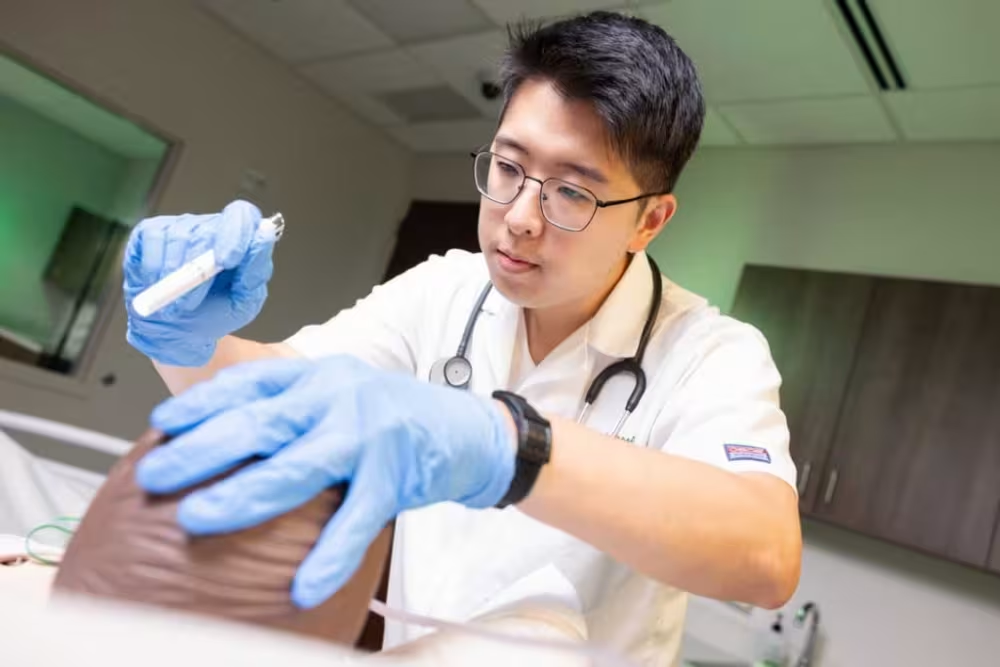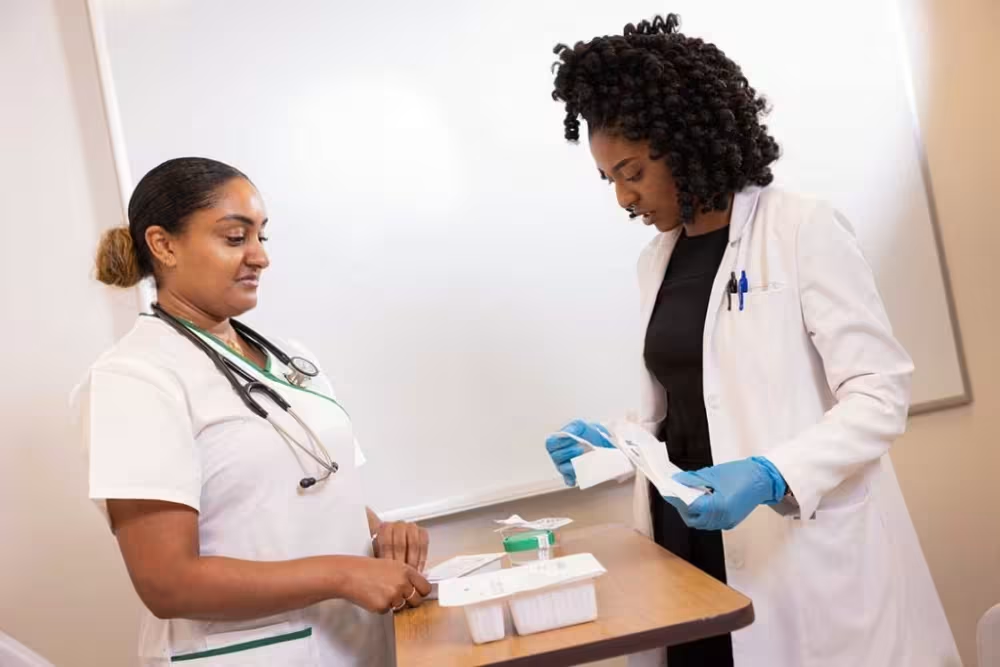How Hard Is It to Get Into Nursing School? Here’s What You Should Know
Each blog post is dated and contains accurate information as of that date. Certain information may have changed since the blog post publication date. If you would like to confirm the current accuracy of blog information, please visit our ABSN overview page or contact admissions at (844) 347-2497.
How hard is it to get into nursing school? Though traditional nursing programs can be competitive, accelerated programs like Felician University’s make nursing school more accessible. We offer four yearly start dates, three to our hybrid program and one to our on-ground program, allowing us to accept more students.

Despite our nation’s nursing shortage, schools across the country continue to turn away tens of thousands of qualified applicants every year, making it more difficult to get into a nursing program.
How hard is it to get into nursing school? Generally, it can be competitive, but your chances often depend on where you apply. If you apply to Felician University’s Accelerated Bachelor of Science in Nursing (ABSN) program, you might have a better chance of acceptance. We offer two program delivery options, a hybrid or entirely on-ground option, and multiple start dates a year, granting the ABSN program the capacity to enroll a high number of students annually, with no waitlist.
To answer the question, “Is it hard to get accepted into nursing school?,” consider factors like enrollment capacity, admission requirements and availability of clinical sites. Felician can make it easier with rolling admissions, multiple start dates each year and exceptional admission support.
Why Is It Hard to Get Into a Nursing Program?
Is nursing school harder to get into if it’s a four-year program instead of an ABSN program? Generally, yes. This is because traditional four-year BSN programs only have two start dates per year and less capacity for enrolling students, whereas accelerated programs can offer multiple start dates a year and have greater student capacity.
Difficulty in being accepted into a nursing program can depend on the school’s enrollment capacity, your academic history and other factors.
Enrollment Capacity
Most nursing schools have limited space and resources, creating highly competitive situations. According to the American Association of Colleges of Nursing (AACN), U.S. nursing schools turned away 65,766 qualified applicants from baccalaureate and graduate nursing programs in 2023. Top reasons included:
- Faculty shortages
- Budget constraints
- Limited clinical placements
- Insufficient classroom space
Academic History and Admissions Requirements
Your academic background indicates whether you’ll be a strong nursing school applicant. Some programs have more stringent requirements. For example, many accelerated nursing programs are second-degree options, which means you must have a completed non-nursing bachelor’s degree to qualify.

In contrast, Felician accepts applications from individuals who have either a completed bachelor’s degree or at least 60 college credits and a minimum cumulative GPA of 3.0. You’ll also need to meet other admission requirements and complete any necessary prerequisites.
The Need for Clinical Sites
Nursing school doesn’t only require coursework; you also must have hands-on learning experiences, including clinical rotations at nearby healthcare facilities. Nursing schools sometimes have a limited number of spots available at their clinical providers, which limits the number of qualified applicants they can accept.
Felician University has partnered with the Atlantic Health System and other leading healthcare providers to provide clinical placements to our ABSN students. Since we have access to more facilities and available rotations, we’re able to accept more students.

What’s the process for becoming a nurse? Here are the steps to become a nurse in NYC.
How Does Felician Make the Admissions Process Easier?
At Felician, we have the space, technology, faculty and clinical partnerships to educate more accelerated nursing students. In addition to accepting both second-degree and transfer students, we have implemented the following factors to make our program and admissions process more accessible to prospective students.
Rolling Admissions
We admit ABSN students on a rolling basis, which means we review applications as they come in rather than waiting for the submission deadline to pass. This approach allows us to provide an admissions decision within a few weeks of applying.
Multiple Yearly Start Dates
Traditional BSN programs typically offer one or two start dates per year, which heightens the competition for limited spots. Felician, however, offers four start dates: three for the Hybrid ABSN program and one for the On-Ground ABSN program, meaning we can accept more students each year.

Additionally, having four enrollment options each year means you won’t have to wait long to begin. These options also offer flexibility as you prepare to meet admission requirements, such as completing prerequisites.
Online Coursework
With an online learning component, Felician can accommodate more students per cohort in our Hybrid ABSN program. After all, online courses don’t require the same amount of classroom space as traditional courses. If you prefer in-person, lecture-based courses, we offer an on-ground course delivery option that can meet your needs.
What’s the difference between the Hybrid ABSN and On-Ground ABSN? It boils down to online based versus traditional education.

Admissions Support
Many nursing school admissions teams are inundated with a high volume of applications. As a result, prospective students don’t necessarily receive the high level of support that’s needed to submit the most competitive application possible.
At Felician University, our admissions team has the bandwidth to make applying to nursing school as seamless and straightforward as possible. As a prospective ABSN student, you’ll work with an assigned admissions counselor whose job is to provide you with a high level of personalized support every step of the way.
Your counselor will help you create and adhere to an academic plan that allows you to start the ABSN program as soon as possible. The plan is typically based on the number of general education and prerequisite courses you still need to complete and your preferred start date in the program.
Tips for Meeting Nursing School Admission Requirements

Since nursing school admissions can still be challenging, you may want to follow some tips for improving your chances of acceptance. Try the following:
- While not required, consider gaining some entry-level healthcare experience to strengthen your application.
- Look for volunteer opportunities in healthcare settings, which can also make you a more competitive applicant.
- When taking prerequisites, work hard to get good grades and master the material.
- Apply as early as you can, but only after you’ve met the requirements.
- Consider relocating for nursing school so you can access better programs.
- Be prepared when meeting with your admissions counselor. Have a copy of your unofficial transcripts ready for the first call.
- Have a friend give you a second opinion on your application materials, including your resume and letter of intent.
- Ensure you submit a complete application with all the supplemental documents.
What GPA Do You Need to Get Into Nursing School?
It varies, depending on the nursing school. Felician requires a minimum cumulative 3.0 GPA for all undergraduate coursework. Of course, having a higher GPA than this is ideal to be a more competitive candidate.

Where should you go to nursing school? Learn how to choose the right nursing program for you.
Begin Your Nursing Path at Felician
While student competition does exist at Felician University, we can enroll a higher number of ABSN students per year than many other nursing programs. Plus, once you’re here, you’ll have the opportunity to graduate in as few as 16 months in our Hybrid or On-Ground ABSN programs.
Start your nursing career sooner and benefit from high-quality nursing education at Felician. Contact an admissions counselor today to get started.
